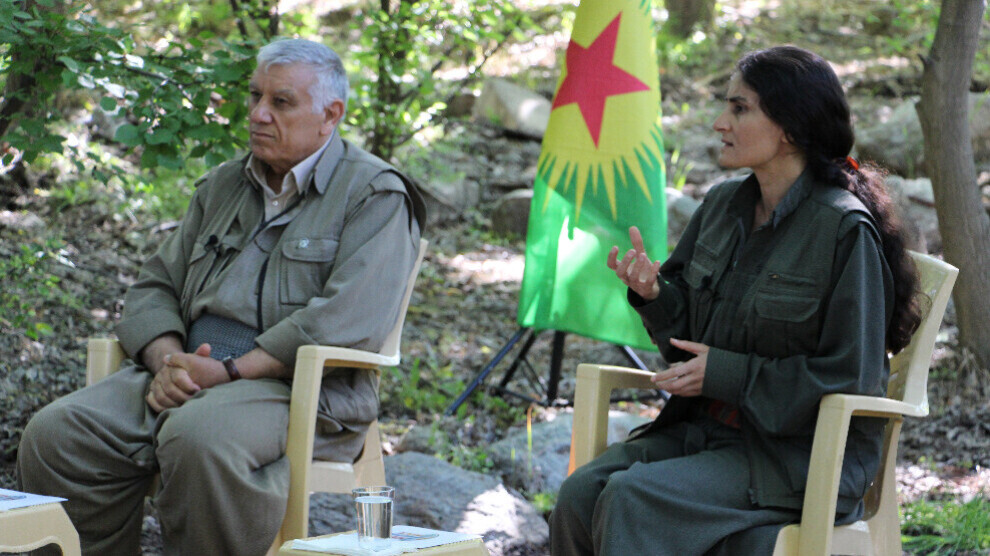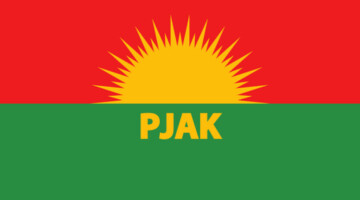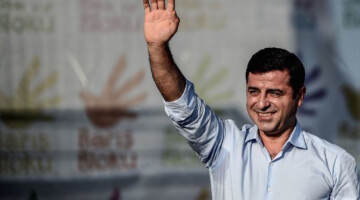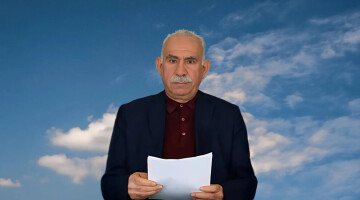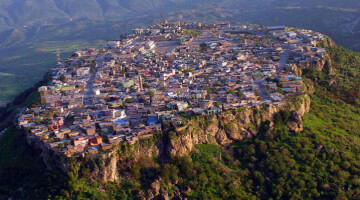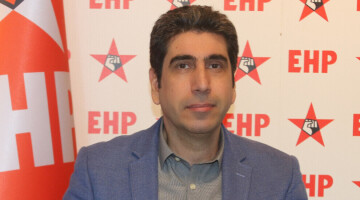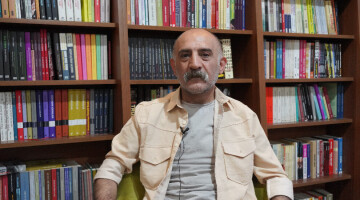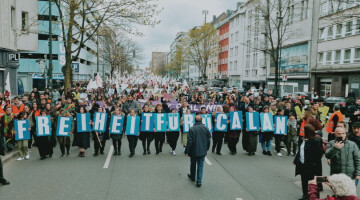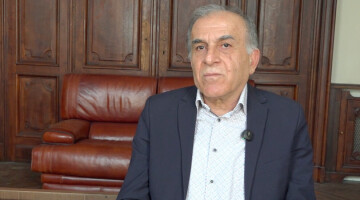How does the Kurdish liberation movement interact with other peoples and religious communities? And what attitude does the movement take towards liberation struggles like that of the Palestinians or the struggles of the native and black people in the US?
KCK chairs Besê Hozat and Cemil Bayık answer these questions in the fourth part of the interview given to the online portal Libyajamahiriya.
The first part of the interview dealt with the concept of independence in capitalist modernity and the understanding of democratic autonomy in a confederal system, which was shaped by Abdullah Öcalan. In the second part, the co-chairs of the executive council of the umbrella organization KCK (Association of Kurdish Societies) answered questions about their economic model and socio-economic developments in Rojava. The third part of the conversation dealt with the PKK's successes in Kurdistan.
Numerous ethnic minorities, such as Assyrians, live in Kurdistan. What relationship does the Kurdish Freedom Movement have with these minorities? And how does it work together with them?
The PKK has ample experience with the negative consequences of nationalism and hostility towards different ethnic and religious communities. Therefore, both because of its socialist convictions and its empathy towards all the different peoples, it has always adopted an attitude based on sympathy, friendship and brotherhood towards these peoples and faith groups. The PKK is the first movement in Kurdistan that has succeeded in uniting Sunni, Alevi and Ezidi Kurds under one roof. Even during the initial phase, when the first group of the PKK was formed, four of the six group members were Alevi Kurds. Among the first leading cadres of the PKK were Haki Karer and Kemal Pir - two very important leading figures of Turkish origin. Many Turkish comrades have fallen as Şehids in the ranks of the PKK.
We have also always approached the Assyrians and Armenians on the basis of sympathy, friendship and brotherhood. There has never been any room for nationalism in the PKK. A certain number of Syriacs still live in Kurdistan. The PKK has always supported them in organizing themselves and in freely living out their faith and establishing their own self-administration wherever they live. It has also supported the establishment of their own organizations and parties in many ways. The sole aim of this support has been to preserve the existence of these communities as part of the diversity of Kurdistan. Our movement considers Kurdistan as the common homeland of Assyrians and Armenians. It respects the way these communities name or define the places where they live and appreciates that they consider Kurdistan as their homeland and live there. The PKK has always adopted an attitude in line with this. Today, with the idea of the Democratic Nation developed by Rêber Apo, this attitude is based on an even stronger historical, social, ideological and theoretical foundation. This attitude consequently implies that the Assyrians and Armenians are equal and native parts of Kurdistan. They have every right to live freely and autonomously. In the hope that we use the right term for this and that this will not be misunderstood, we can even say that we consider ‘positive discrimination’ towards them to be necessary. For they, too, have experienced great injustice in Kurdistan. Even if not based on their own political will, some Kurds, under the auspices of the ruling classes, participated to a certain extent in the injustice perpetrated against the Assyrians and Armenians. Today, without getting caught up in such complexes of the past and without having the slightest doubts, we can overcome this historical injustice to a large extent by living a free and equal life together in our common homeland.
We do not harbor any negative attitudes toward the Assyrians. They possess all their rights in Kurdistan, without exception. It is completely out of the question that we could have a negative attitude towards them. However, from time to time they may have a negative attitude towards us because of their relations with certain states. Yet, we do not reject, but comprehend this attitude. Whatever may happen, we will never change our attitude toward them. Because this attitude is what makes up our identity and character. If we learn that there are occasional mistakes in Rojava in this context, we use our influence and try to support the correction of these mistakes. This issue is more sensitive and important to us than any other. We cannot tolerate injustice to other peoples and faith groups. If we do not show this sensitivity, we will lose our own identity and character. At the same time, this would mean that we would be very disrespectful to Rêber Apo. He does not tolerate injustice towards other peoples, faith groups and women. Neither does he forgive those who are responsible for this injustice.
We regularly have direct exchanges with the Assyrian parties and friends. We meet their demands and proposals as well as our current resources allow us to. We also regard our amenities and resources as their own. We do not make any difference in this matter. Our relations with them take place within the framework of equality and justice. We thus continue the relationships established decades ago by Rêber Apo, based on mutual respect, and the way of working that goes along with it. We are also always open for any form of criticism on their part.
What is the attitude of the Kurdish Freedom Movement towards liberation struggles such as that of the Palestinians or the struggles of native and black people in the United States?
As a national liberation movement, we have always had sympathy and interests for the national liberation struggles in the other parts of the world. We were also greatly influenced by reading the books of other national liberation movements and by closely following their struggles. In particular, in the early 1970s, the national liberation struggle in Vietnam had a tremendous influence on us. We used to regard Ho Chi Minh and Giap as true leaders of national liberation. The words of Ho Chi Minh - `Nothing is more precious than independence and freedom` - became our basic slogan. The book on the history of the Workers’ Party of Vietnam was read by all our cadres and supporters at that time.
The Palestinian struggle also had a direct influence on us. Rêber Apo and our movement went to Palestine even before the military coup on September 12, 1980. There they received support and experienced the solidarity of the Palestinians. Our first guerrilla fighters were trained in the Palestinian camps. When our party retreated to the Middle East after the fascist military coup on September 12, 1980, it also received a lot of support from the Palestinians. It is undeniable that the Palestinian people and their political forces supported our movement to regroup after the military coup and at the same time to prepare for the guerrilla struggle. They will always remain the friends of our struggle. We support their struggle for freedom.
Until 1982, when Israel occupied Lebanon, we lived closely together in common camps. In the war against Israel at that time, PKK members fought on the front lines shoulder to shoulder with their Palestinian sisters and brothers. In the war against Israel, eleven very valuable comrades of ours fell as Şehids and nearly 20 others were injured. These fallen represent an indestructible bridge between us and the struggle of the Palestinian people. We firmly believe that the Palestinians will achieve freedom, democracy and self-rule in their homeland. They have earned this right because of their tremendous struggle. Rêber Apo has always regarded the PKK not only as a freedom struggle of the Kurds, but of all oppressed people. Accordingly, he has fundamentally oriented the entire practice of the PKK towards liberating all oppressed groups and faith communities in Kurdistan and the Middle East. Because this necessity arises from our ideology. In the context of such an ideology, various peoples have joined the PKK. After all, the idea of the Democratic Nation developed by Rêber Apo is not based on only one ethnic group, but includes the most diverse ethnic and religious communities. On this basis, we support the struggle for freedom and democracy of all oppressed people in this world.
We consider it the duty of all socialist and democratic movements and people to support the struggles of indigenous and black people in the USA. It is very important that the rights of indigenous people everywhere in the U.S. be defended and restored. As the real owners of the land, they must be able to live a free and democratic life in their homeland. For this to happen, it is important that they have all the resources necessary for this kind of life. So the indigenous people of the United States must have enough land to live a free and democratic life. It is equally important that they develop a free and autonomous life wherever they have a strong presence as a community.
There is no doubt that it is very important that the black population in the USA enjoys the same rights as all others as citizens of the country. In all areas of social, cultural and political life, all forms of discrimination and exclusion
must come to an end. There must be no inequality in any area of life. Humanity as a whole – especially the U.S. – owes this to the black people. This debt must be paid by recognizing the most basic rights of the black people, while ensuring that they can live fully equal and free lives. If they fail to do so, neither the U.S. nor the rest of humanity can claim to truly value equality, morality, justice, equity, freedom and democracy.

